A week after the terror attack in Neve Ya’akov in which seven people were murdered, listeners to two BBC radio stations heard reports from the BBC Jerusalem bureau’s Yolande Knell relating to that incident.
Both of Knell’s very similar reports used the same framing that has been evident in BBC coverage of Palestinian terrorism since last year:
- Promotion of false equivalence between victims of terror and perpetrators of terror and violence
- Promotion of false equivalence between terror attacks and counter-terrorism operations
- Failure to provide the full background to the rise in terrorism in Judea & Samaria such as Hamas funding and supply of weapons, foreign weapons supply, internal political issues within the Palestinian Authority, participation of PA security forces in terror and violence
That framing enables the BBC to promote the trite notion of a ‘cycle of violence’ and thus avoid the issue of Palestinian responsibility for the deterioration over the past year and a half.
The lead item in BBC Radio 4’s ‘From Our Own Correspondent’ on February 4th (from 00:44 here) was labelled “Grief and Grievances in Israel and the Occupied West Bank”.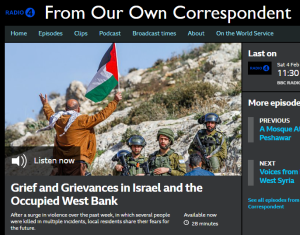
“There has been a surge in violence over the past week in Israel and the occupied West Bank, in which several people were killed – first in a military raid on a refugee camp, then in an attack on a Synagogue. Yolande Knell visited Jenin and East Jerusalem, where these incidents took place, and spoke to local residents about their fears of further violence and scepticism that a solution will be found.”
Presenter Kate Adie gave a similar introduction: [emphasis in italics in the original, emphasis in bold added]
Adie: “First, there’s been a surge of violence in Israel and the occupied West Bank in recent days which is unmatched in years and there are fears it could escalate further. Just over a week ago an Israeli military raid on Jenin refugee camp in the occupied West Bank killed ten people. The next day seven people were shot dead by a Palestinian gunman near a synagogue in occupied East Jerusalem. The flare-up has come with Israel’s most nationalist government ever in power and as many young Palestinians have lost faith in their political leaders. Yolande Knell has been to the scenes of the recent attacks.”
Knell’s report opens with a description of posters of ‘martyrs’ on a wall in Jenin which she describes as “a stark reminder of the scale of Palestinian casualties from this part of the occupied West Bank”.
Knell: “Of the more than 180 killed in the territory, including East Jerusalem, since the start of last year, about a third were from the Jenin area. Some were shot dead after attacking Israeli civilians, including in a bar in Tel Aviv. Others during fighting with soldiers. And there’ve also been locals caught up in the violence such as a teacher giving first aid and a girl fetching her cat.”
Knell made no effort to clarify to listeners what proportion of those killed were terrorists or people involved in violent rioting or how many were “locals caught up in the violence” even though that information is in the public domain. Neither did she bother to explain the factors which have made Jenin the main hub of terror – and therefore casualties – in recent months. Indeed, referring to the January 26th counter-terror operation in Jenin, Knell once again fails to differentiate between terror operatives and uninvolved civilians when she goes on to refer to “the ten killed in last week’s Israeli raid; the deadliest here in over 20 years”.
Her portrayal of that counter-terrorism operation includes “gun battles between soldiers and local gunmen” and superfluous qualification in a description of the site of the operation as “the house it [Israel] said was being used as a hideout by an Islamic Jihad cell plotting major attacks”.
Knell tells listeners of “three fighters” and “two civilians” killed during the operation but fails to clarify that others were also members of the Palestinian Islamic Jihad or Fatah’s Al Aqsa Martyrs Brigades, including a member of the PA security forces.
Knell then moves on to the topic of the January 27th terror attack which she describes as having taken place “in an Israeli settlement, Neve Ya’akov in East Jerusalem”. Unsurprisingly, Knell failed to inform listeners that Neve Ya’akov was established in 1924 on land purchased by Jews but had to be abandoned when Jordan invaded Judea & Samaria and parts of Jerusalem in May 1948.
Listeners hear vox pop interviews in broken English with teenage girls described by Knell as being “from a West Bank settlement” which include the phrases “our land” and “we’re the chosen people” before Knell mentions the January 28th attack in Ir David, claiming that in both cases the attackers were “close to teenagers recently killed by Israeli forces”.
She makes no effort to inform listeners that one of those teenagers (said to be distantly related to the Neve Yaakov attacker) was masked and carrying what later turned out to be a fake gun during violent rioting in the Shuafat neighbourhood and the other was throwing firebombs at police officers in the Silwan neighbourhood.
Knell’s focus then returns to Jenin where she tells listeners that “locals saw their political leaders as corrupt and out of touch” and mentions support for “another Palestinian intifada”.
Listeners to the BBC World Service radio programme ‘Weekend’ on the same day heard a very similar report from Knell (from 04:49 here) which was introduced by presenter Audrey Brown as follows:
Brown: “January has been one of the most deadly months in years for Israelis and Palestinians in the occupied West Bank and East Jerusalem. More than 30 Palestinians have been killed by Israeli forces, including ten in a raid on Jenin refugee camp. Seven Israelis were killed during the Jewish sabbath last week when a Palestinian gunman opened fire outside a synagogue in a settlement. Our Middle East correspondent Yolande Knell has been back to the scene of the shooting and to Jenin to ask Israelis and Palestinians what happens next.”
Once again listeners are told nothing of the history of Neve Ya’akov either by Brown or Knell, who also opens by referring to that Jerusalem neighbourhood as a “settlement”. The same teenage girls and the same phrases are heard and, as in her Radio 4 report, Knell shoehorns “Israel’s new government; the country’s most Right-wing ever” into the story even though the current wave of terror began long before it took office.
Knell goes on to state that in “Palestinian neighbourhoods in East Jerusalem”:
Knell: “…there’s increasing disquiet. Both the synagogue attacker and a 13-year-old who later shot and wounded two Israelis were close to Palestinian teenagers shot dead in recent confrontations with Israeli forces.”
Once again she makes no effort to clarify what those teenagers were doing at the time. Moving on to Jenin, Knell tells listeners that the “latest Israeli raid…killed ten people, two of them civilians”:
Knell: “Israeli forces say they were targeting an Islamic Jihad cell plotting major attacks when they came under fire from armed fighters in the camp. Jenin’s seen repeated Israeli incursions since a series of deadly attacks by Palestinians on Israelis early last year. Several attackers were from this area. Now some here are calling for a new uprising.”
Failing to provide listeners with any information about the background to the rise of terror in Jenin and elsewhere in areas supposedly under PA control, Knell amplifies calls for a “third intifada” and tells listeners of “despair because of what’s seen as the lack of any meaningful plan for lasting peace”. She of course neglects to mention that neither the Palestinian Islamic Jihad, which has a major presence in Jenin, nor Hamas – which is stoking the fires – have any interest whatsoever in “lasting peace”.
Following Knell’s report, Audrey Brown turned to one of her studio guests – former BBC journalist Kate Clark – for comment, noting that she used to live “in Bethlehem and Jerusalem”.
Clark: “I did, back in the late 1980s. Before I became a journalist I was teaching English and it was the time…it was the first intifada, which listeners might remember, it was a non-violent uprising by Palestinians against the Israeli military occupation. But it was also a time of great hope that Palestinians were organising themselves for the first time.”
Brown made no effort to challenge the lie that the first intifada – during which, according to a BBC report from 2017, two hundred and seventy Israelis were murdered and around a thousand Palestinians were killed by their fellow Palestinians – was “non-violent”. Notably Clark promoted the same lie on the same radio programme last July.
Having referred to “a peace deal…in the early 90s”, Brown then allowed her guest to promote the falsehood that the Oslo Accords failed because of “settlements”.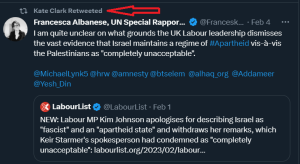
Clark: “Ehm, there was a peace deal but that…I mean many people would say that was where the trouble started because the settlements have just kept being built. I was looking at the figures; Peace Now, which is an Israeli peace group, do something called settlement watch. I was looking at the figures and when I was there in the late 80s there were 60 thousand settlers. There’s now 460 thousand settlers.”
Brown: “So people or…”
Clark: “People.”
Brown: “And these are settlements that have gone into various parts of the territory.”
Clark: “Onto the occupied territory. That’s Palestinian land. So how can you have a peace process that’s aimed at having two states when one party is taking land? And as those Israelis said, [the teenage girls in Knell’s report] they believe it’s their land.”
Unsurprisingly, the obviously underinformed Brown failed to challenge those partisan talking points by reminding listeners that the Oslo Accords were derailed by the PA initiated second intifada and that the Palestinians have repeatedly turned down subsequent proposals. Neither did she clarify that what Clark inaccurately described as “Palestinian land” is in fact Area C according to the Oslo Accords and its final status is subject to negotiation.
Once again we see that the BBC’s domestic and global audiences are not receiving accurate and impartial information concerning the background to the rise in Palestinian terrorism and that framing promoting false equivalence that clouds that background is the predominant narrative in BBC reporting.
Related Articles:
BBC NEWS GIVES A SENTIMENTAL ACCOUNT OF THE FIRST INTIFADA
BBC PROMOTION OF THE MYTH OF A NON-VIOLENT FIRST INTIFADA
BBC NEWS WEBSITE COVERAGE OF JENIN COUNTER-TERRORISM OPERATION
BBC NEWS CONTINUES TO PRESENT A PARTIAL PICTURE OF TERROR IN JENIN
LOOKING BEHIND BBC PORTRAYAL OF PALESTINIAN CASUALTIES IN JANUARY
BBC REPORTING ON NEVE YA’AKOV TERROR ATTACK
BBC’S DIZENGOFF ATTACK REPORT TIPTOES AROUND PALESTINIAN TERRORISM AND INCITEMENT

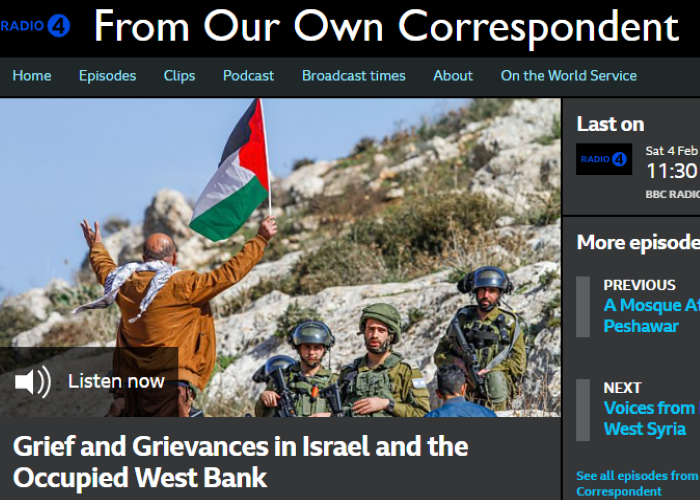

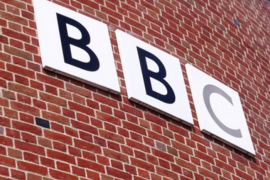

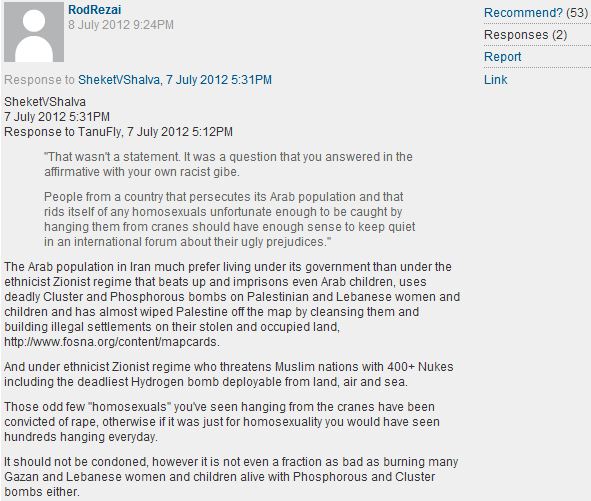
The BBC correspondents walk around with their eyes closed, ears shut and their brains dumbed by the policy of the BBC to lie about Jewish rights in the Holy Land. Should we now demonstrate outside the homes in Israel of the journalists involved. Knell lives in Beit Sufafa – an Arab enclave within the municipal boundaries of Jerusalem – located in south Jerusalem.
See https://www.google.com/maps/place/Jerusalem,+Israel/@31.7459355,35.1981428,15.75z/data=!4m6!3m5!1s0x1502d7d634c1fc4b:0xd96f623e456ee1cb!8m2!3d31.768319!4d35.21371!16zL20vMDQzMF8